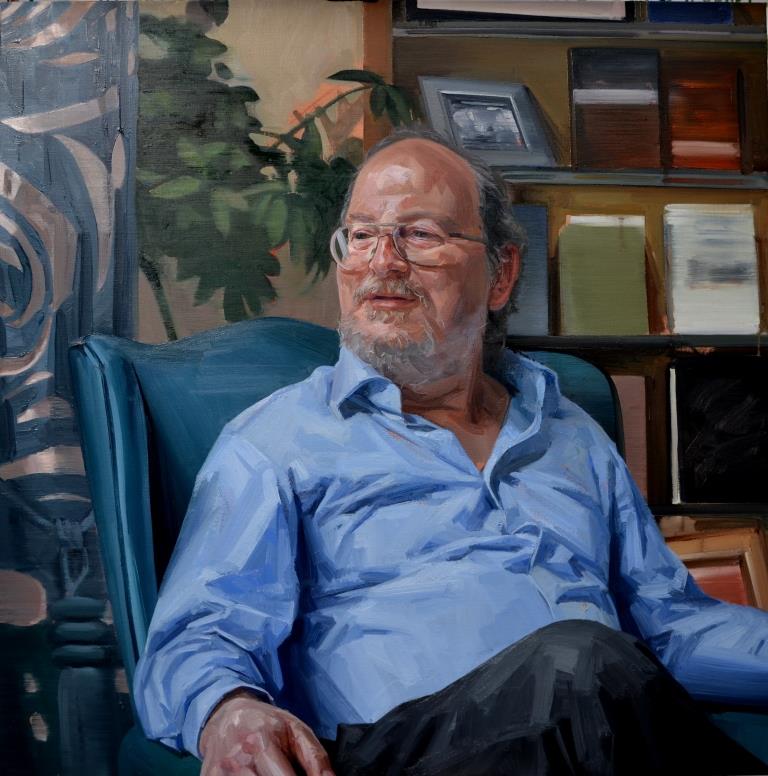Academics, Agents and Activists: A history of the School of Oriental and African Studies, 1916-2016
John Hollingworth, Gallery Manager and co-curator of ‘Academics, Agents & Activists: a history of the School of Oriental and African Studies, 1916-2016’, continues his overview of this fascinating centenary exhibition recently on display at the Brunei Gallery, which showcased material from the incredibly rich archive collections at SOAS – both the School’s own institutional archive and material held by Archives & Special Collections, SOAS Library. The exhibition was organized around the tenures of the School’s Directors, with the eighth being that of Paul Webley.
The Webley Years, 2006 – 2015

Professor Paul Webley CBE (1953 – 2016), Director of SOAS (2006 – 2015), 2014, oil on canvas, Tai Shan Schierenberg (b. 1962). Ref: SOASAW2014.0250.01 © SOAS
Professor Paul Webley CBE became Director and Principal of SOAS and subsequently was made Deputy Vice-Chancellor of the University of London in 2010. His tenure was characterized by new developments, noteworthy achievements as well as significant challenges. Among these challenges were the introduction of fees for home students and the reduction in central government funding for universities. Until the introduction in fees student numbers had risen significantly, reaching a high of over 7,000 in the year 2008-09, a notable increase.
The number of new centres and schools created at SOAS during the Webley years is also notable, and has enabled the expansion of research and teaching activities as well as outreach at the School. In the year 2006-07, two new centres were created: the Centre for Food Studies and the Centre for Migration and Diaspora Studies. In 2011-12 the Doctoral School was launched in the newly refurbished facility at 53 Gordon Square. In the following year, the new China Institute, the South Asia Institute and the School of Arts were created, forming multi-disciplinary communities of scholars. Existing centres and institutes also organized major events which situated SOAS in the wider world of global history, such as the conference hosted in 2007 by the Centre for African Studies to mark the occasion of the 200th anniversary of the abolition of slavery act.
As well as research, there were developments in teaching and school facilities during Paul’s tenure that also improved the student experience and the School’s competitiveness, such as the new LLM introduced by the Law department. SOAS was also granted the power to award its own degrees, as opposed to University of London degrees. This was a significant step towards School’s aim to be an autonomous, self-directed and sustainable institution. The excellence in teaching at the School was recognized for a second time with the receipt of the prestigious Queens Anniversary Prize in 2009.
In terms of the estate, the Library Transformation Project was begun in 2010, and completed in 2012, creating more space for users and holdings. Webley also initiated plans for the expansion of SOAS into the North Block of Senate House, a move made possible by generous donations, especially from the Alphawood Foundation which gave SOAS one of the largest charitable donations ever made to a UK university. This helped to transform the study and understanding of Southeast Asian art and supported the state-of-the-art renovation of the North Block of Senate House on the SOAS Bloomsbury estate.
Paul took on a national role as Chair of the Board of Trustees of the UK Council for International Student Affairs. He was also a member of the Editorial Board of the Journal of Economic Psychology and the former President of the International Association for Research in Economic Psychology, and was elected to the Academy of Social Sciences in 2010. Paul was fittingly recognised for his work when appointed Commander of the Order of the British Empire (CBE) in the 2015 New Year Honours for services to higher education, due to ill health he was forced to step down as Director in the same year. Paul very sadly passed away in early March 2016.
“As we approach our centenary in 2016-17, SOAS can be proud to have had Paul as its champion and leader for the last decade. He leaves a great legacy. Paul’s warmth, generosity and loyalty was felt by all. The whole SOAS community of staff and students, alumni and friends and supporters are greatly saddened by his loss….” (Baroness Valerie Amos, SOAS Director, 2016)

Graça Machel DBE is a renowned international advocate for women and children’s rights and has been a social and political activist for many decades. She was named President of SOAS in 2012. © SOAS

Daniel Barenboim in Conversation with Jon Snow. Daniel Barenboim was awarded an Honorary Doctorate (DMus) from SOAS in 2008. Known as a musical “bridge builder”, he is recognised both for his virtuosity as a musician and for his work toward peace in the Middle East. Uniquely, he holds both Israeli and Palestinian citizenship. © SOAS

Graduation. Michael Palin was awarded an Honorary Fellowship from SOAS in July 2008. He supported the Hodgson Archive Cataloguing Project at SOAS, which catalogued the work of the first European scholar to conduct research in Nepal. His generosity has also enabled the creation of the Michael Palin Scholarship for the post-graduate intensive MA in South Asian Studies at SOAS. © SOAS

